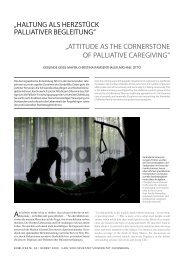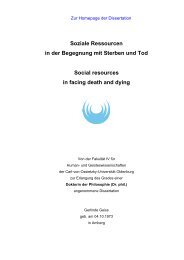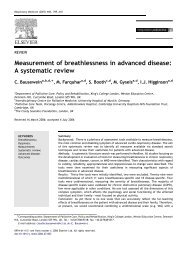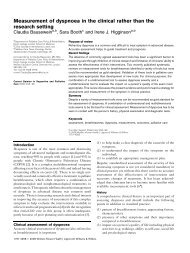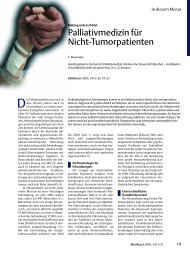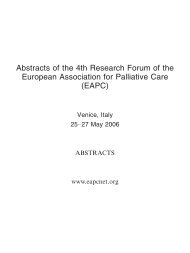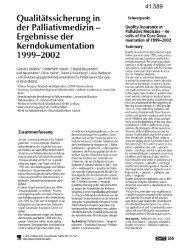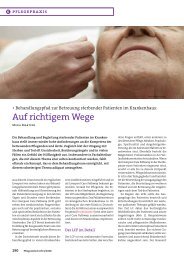EAPC - ipac
EAPC - ipac
EAPC - ipac
Create successful ePaper yourself
Turn your PDF publications into a flip-book with our unique Google optimized e-Paper software.
402 <strong>EAPC</strong> Abstracts<br />
Andrea Menke Vodafone Foundation Institute for Children’s Pain Therapy<br />
and Paediatric Palliative Care Datteln GERMANY<br />
Markus Blankenburg Vodafone Foundation Institute for Children’s Pain<br />
Therapy and Paediatric Palliative Care Datteln GERMANY<br />
Stefan J. Friedrichsdorf Pain and Palliative Care Program, Children’s<br />
Hospital and Clinics of Minnesota Minneapolis U. STATES<br />
Dörte Garske Vodafone Foundation Institute for Children’s Pain Therapy<br />
and Paediatric Palliative Care Datteln GERMANY<br />
Bettina Hübner Vodafone Foundation Institute for Children’s Pain Therapy<br />
and Paediatric Palliative Care Datteln GERMANY<br />
Joanne Wolfe Department of Pediatric Oncology, Dana Faber Cancer<br />
Institute and Children’s Hospital, Boston, U. STATES<br />
Tanja Hechler Vodafone Foundation Institute for Children’s Pain Therapy<br />
and Paediatric Palliative Care Datteln GERMANY<br />
Background: The purpose of the present study was to investigate bereaved<br />
parents’ perspective on four essential areas: 1) characteristics of the child’s<br />
death, 2) anticipation of their child’s death and care delivery, 3) end-of-life<br />
decisions and 4) impact of the child’s death on the parents and perceived<br />
social support by the health care team. Methods: Cross-sectional observational<br />
study. Parents of 48 children (31 boys, 17 girls), who died due to cancer<br />
were interviewed on average 47 months after the child’s death utilising a<br />
validated semi-structured interview. Results: 48% of the children died at<br />
home even though 88% of the parents chose ‘at home’ as the most appropriate<br />
locale of death in hindsight. Parents anticipated their child’s death on<br />
average 9 weeks prior to the child’s death. When asked how they anticipated<br />
their child’s death 48% reported through a discussion with the health care<br />
team. 41% of the parents provided palliative home care for their child and the<br />
majority (88%) rated the quality of care as good or very good. 64% discussed<br />
end-of-life decisions with the health care team, 36% did not have a discussion.<br />
Parents were clearly affected by their child’s death. However, 15% of<br />
the parents were not contacted by the health care team following the child’s<br />
death. Conclusions: Parents’ perspective on their child’s death and related<br />
end-of-life decisions highlighted the importance of communication between<br />
parents and the health care team. Future studies need to investigate potential<br />
barriers in the communication between parents and the team to optimise<br />
end-of-life decisions and hence, reduce parents’ long-term distress. In line<br />
with the previous, the present data demonstrated that there is still a lack of<br />
routine contact from the health care team following the child’s death despite<br />
existing guidelines. Research is therefore needed into the implementation of<br />
guidelines for routine contact into clinical practice following a child’s death.<br />
10 Oral Presentation<br />
Family and Children<br />
Evaluation of a psycho-educational group program for family<br />
carers in home based palliative care<br />
Authors: Peter Hudson Centre for Palliative Care Education & Research<br />
St Vincent’s & The University of Melbourne AUSTRALIA<br />
John Fisher Grampians Regional Palliative Care Victoria AUSTRALIA<br />
Karen Quinn Centre for Palliative Care Education & Research, St Vincent’s<br />
& The University of Melbourne Victoria AUSTRALIA<br />
Linda Kristjanson Curtin University of Technology Western Australia<br />
AUSTRALIA<br />
Maxine Braithwaite Caritas Christi Hospice, St Vincent’s Hospital<br />
Melbourne Victoria AUSTRALIA<br />
Kristina Thomas Centre for Palliative Care Education & Research,<br />
St Vincent’s & The University of Melbourne Victoria AUSTRALIA<br />
Background: Family carers are often responsible for providing significant<br />
support to relatives who require palliative care at home. However, evidence<br />
suggests family carers have limited information, resources or evidence based<br />
support to prepare them for such a role. Furthermore, family caregiving can<br />
be associated with negative physical, financial and psychosocial outcomes.<br />
This project sought to examine the utility of a group family carer psychoeducational<br />
program focused on preparing primary family carers for the role<br />
of supporting a relative with advanced cancer at home. Methods: The education<br />
program (based on our published pilot work) consisted of three consecutive<br />
weekly sessions presented in a group format, conducted at six home<br />
based palliative care services in Australia. Participating carers were required<br />
to complete a set of self-report questionnaires measuring carer competence,<br />
preparedness, optimism, rewards, social support, burden and information<br />
needs, at three time points: commencement of the program (T1), upon completion<br />
(T2), two weeks later (T3). Carers were also asked to report on the<br />
relevance, accessibility, acceptability, and content of the program. Repeated<br />
measures ANOVAs were utlised for the analysis. Results: Twelve programs<br />
were conducted, with 74 carers attending the first session. Forty-four carers<br />
completed all three data collection sets. Following the intervention, a significant<br />
positive effect was found for the following outcomes: preparedness for<br />
the caring role, caregiving competence, caregiving rewards, and having<br />
information needs met from T1 to T2. These improvements were maintained<br />
at follow-up (T3). Feedback on the individual sessions and entire program<br />
was favorable. Conclusions: This study demonstrated that a group education<br />
program to prepare family carers for the role of supporting a dying relative at<br />
home was accessible, applicable and effective.<br />
11 Oral Presentation<br />
Family and Children<br />
A meta-ethnographic study of informal caregivers’ perceptions<br />
of caring for a loved one or dependant with advanced cancer at<br />
home<br />
Authors: Mandy Stratford Community Specialist Palliative Care Arthur<br />
Rank House UNITED KINGDOM<br />
Jonathan Koffman King’s College London School of Medicine London<br />
UNITED KINGDOM<br />
Background: Previous studies of caring for dependants or loved-ones with<br />
advanced cancer at home have been limited to cross-sectional descriptive<br />
studies. Although few qualitative studies have been conducted, they do provide<br />
a deeper insight into this experience. Aims: To conduct a metaethnographic<br />
review of qualitative studies that explored the informal caregivers’<br />
perception of caring for a ‘loved one’ or dependant with advanced<br />
cancer at home. Methods: Review guided by method developed by Noblit<br />
and Hare. Inclusion criteria include studies published between Oct 99 and<br />
Oct 04. Synthesis of data involved a 7 step process which translated and synthesised<br />
key themes, concepts and metaphors from studies to create new theory.<br />
Results: Systematic literature review identified 12 possible studies for<br />
inclusion. Following application of quality assessment 5 studies were selected.<br />
The following key concepts were identified: (i) ‘Work of caring’ which<br />
included the provision of physical, psychological, social and spiritual aspects<br />
of care and its impact carers’ own well-being; (ii). ‘Relationships’ that existed<br />
between carer and dependant and how they changed; (iii) ‘Informal support’<br />
the meaning of practical, emotional and social support caregivers; (iv)<br />
‘Formal support’ the roles of services in assisting caregivers and the challenges<br />
of accessing appropriate and timely care; and (iv) ‘Finding meaning’<br />
caregivers perception of finding meaning in the role that included reciprocity,<br />
love and achievement. Conclusions: The emphasis of dying at home is<br />
now being promoted by statutory and voluntary sector organisations, but little<br />
attention is placed on the roles of informal caregiving that make this possible.<br />
The results of this meta-ethnography show that caregiving is multidimensional<br />
experience that exacts costs of those involved. Services should<br />
invest more in this underserved and under-research population group.<br />
12 Invited Lecture<br />
Divide et impera: by joint forces and disciplines alleviate<br />
suffering from cachexia<br />
Assessment and classification of cachexia: any promise for<br />
innovative clinical trial design <br />
Authors: Vickie Baracos Department of Oncology, Division of Palliative<br />
Medicine Cross Cancer Institute, University of Alberta CANADA



